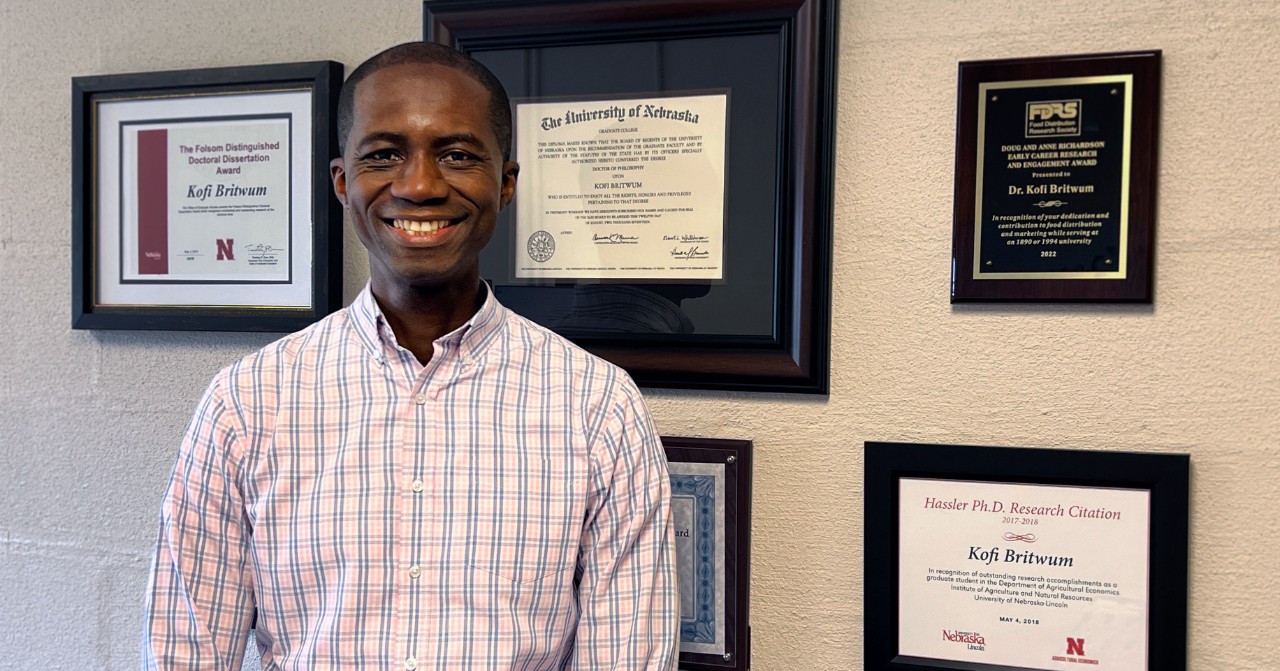
Category: Applied Economics and Statistics

Meet our new faculty: Kofi Britwum
September 30, 2024 Written by Nya Wynn | Photos courtesy of Katie Young
While earning his master’s degree in agricultural and resource economics at the University of Delaware, Kofi Britwum fell in love with Delaware and the atmosphere in UD College of Agriculture and Natural Resources. So, a few years after completing his Ph.D. at the University of Nebraska, he decided to return to UD as an assistant professor of farm management and agricultural economics.
“While I was in Nebraska, I would come here during the summer breaks to meet with my friends,” Britwum said. “But every time I came, I also made sure to visit [the Department of Applied Economics and Statistics], to visit with some of my professors. I just love the state and I love the department; you can't beat that, can’t beat it.”
Since returning, Britwum has not missed a beat. He is developing new courses in agribusiness and world food economies for food and agribusiness marketing and management (FABM) students and pioneering research that has both local and global impacts. One such course is Farm Management (APEC350), a crash course on everything related to running a farm or any type of agricultural business. Students learn accounting skills, how to interpret financial statements, and how to develop budgets and investments for agricultural related projects.
“The course is really going to be useful for [FABM] and other majors in CANR, especially if they end up in a position where they play some managerial role in an agricultural business,” Britwum said. “But even if they don't end up in that sphere, it still equips students with skills to pursue careers in banking, consulting or marketing.”
Another class in development is dubbed World Food Economies; Britwum will focus on food production, and supply and demand of food with a global perspective. One of the course highlights is how food prices and quantities are determined and how students can predict them.
This course also dives into economic disparities between countries across the world based on different levels of agricultural development.
“We’ll examine food within the framework of the macroeconomy,” he said. “Basically looking at things from farm to fork and how that looks across different regions globally.”
In addition to developing multiple courses to enhance the FABM major, Britwum currently has several research projects happening across the globe. In step with the college’s land-grant tripartite mission, Britwum’s position encompasses teaching, research and UD Cooperative Extension work.
One of his research projects,, funded by Northeast Extension Risk Management Education (NERME), focuses on examining farmer knowledge, attitudes and preferences for different grain marketing instruments. Britwum is examining forward contracts, futures and options—all marketing tools available to farmers ahead of a harvest. These tools allow farmers to lock in the price of grain, while also mitigating risks amid volatile agricultural prices.
“There is evidence that farmers don’t often utilize these marketing instruments and the goal of this research is to try to understand why this is the case,” Britwum said. “By looking at differences in the extent to which these instruments are used, our findings can help inform future educational and outreach opportunities.”
Another focus of Britwum’s research is exploring consumers’ valuation of poultry products across various management systems. The results will be insightful to poultry farmers in Delaware and beyond.
“Even though the study is consumer focused, findings will be valuable to farmers who may be considering transitioning from conventional production systems, which is still the predominant system, to any form of cage free system,” Britwum said.
This research provides valuable insights into the perceived value of the newer systems. Britwum emphasizes that they’re not trying to convince farmers to switch methods. Rather, the goal is to simply provide them information about what consumers value when looking to purchase poultry products, which can help farmers make informed decisions about their poultry production.
Finally, Britwum’s research extends to Africa where he is investigating farmer willingness to adopt micronutrient biofortified crops. Most studies related to biofortified crops examine this topic from the perspective of the consumer, largely seeking to understand reasons why consumers choose to buy biofortified food products; however, Britwum is looking at it from the producers’ perspective.
“We’re looking at crops such as cassava, sweet potato and rice, and then looking at micronutrients including vitamin A, zinc and then iron, across six different countries in West Africa and Central Africa,” Britwum said. “We are trying to highlight to farmers the private and public benefits of adopting these micronutrient fortified products.”
The private benefit to many farmers in these areas would be that biofortified crops could potentially help their own families. They could also sell the rest of the crop. Britwum also emphasizes the public good as biofortified crops can help nursing mothers, and prevent blindness and stunted growth.
“The combination of this information could resonate much better with farmers across these countries,” Britwum said. “This research has really important food policy implications within these countries and across the region, so I’m really excited to be a part of it.”
As if he needed a larger workload, Britwum is pioneering several more projects ranging from agritourism in Delaware to food preferences based on cultural heritage in African and South Asian countries. A large part of his passion lies in understanding how perspectives are formed about agricultural products and how this can affect the economy on a larger scale.
“The most fascinating part of my research is the fact that people can see the same things, but draw completely different conclusions or have completely different interpretations,” Britwum said. “It just goes to show you how diversified people see things, and how the role of information influences behavior and preferences. It’s all very fascinating to me.”
